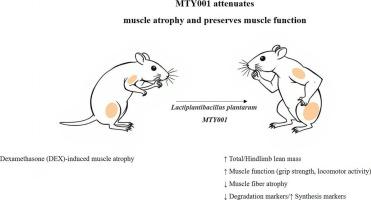MTY001益生菌改善地塞米松诱导的萎缩小鼠模型的肌肉质量和功能
IF 4
2区 农林科学
Q2 FOOD SCIENCE & TECHNOLOGY
引用次数: 0
摘要
背景:肌肉萎缩是一个重要的健康问题,需要有效的治疗策略。益生菌通过肠道-肌肉轴显示出潜力。本研究筛选具有抗肌肉萎缩特性的益生菌菌株。方法选择MTY001(泡菜)和MTY101(萝卜泡菜)2株植物乳杆菌,观察其保护作用。用地塞米松(DEX)诱导的C2C12肌管模型检测其培养上清(CS),用DEX诱导的肌萎缩小鼠模型检测MTY001(品系)。结果MTY001中的C2C12抑制降解,激活合成代谢途径。在小鼠中,MTY001显著改善了功能(保持握力和运动活动),增加了总/后肢瘦质量,减轻了肌纤维萎缩。分子分析显示MTY001调节蛋白水解、分化和合成的关键调控因子。体外MTY101 CS和小鼠MTY101也观察到类似的效果。综上所述,这些发现证明MTY001是一种很有前景的治疗肌肉萎缩的多靶点益生菌。本文章由计算机程序翻译,如有差异,请以英文原文为准。

MTY001 probiotic improves muscle mass and function in a dexamethasone-induced atrophy mouse model
Background
Muscle atrophy is a critical health concern requiring effective therapeutic strategies. Probiotics show potential via the gut-muscle axis. This study screened for probiotic strains with anti–muscle atrophy properties.
Methods
Two Lactiplantibacillus plantarum strains, MTY001 (kimchi) and MTY101 (radish kimchi), were selected for protective effects. Their culture supernatants (CS) were tested in a dexamethasone (DEX)-induced C2C12 myotube model, and MTY001 (strain) was tested in a DEX-induced muscle atrophy mouse model.
Results
In C2C12, CS from MTY001 suppressed degradation and activated anabolic pathways. In mice, MTY001 significantly improved function (preserving grip strength and locomotor activity), increased total/hindlimb lean mass, and mitigated muscle fiber atrophy. Molecular profiling showed MTY001 modulated key regulators of proteolysis, differentiation, and synthesis. Similar effects were observed with MTY101 CS in vitro, and MTY101 in mice.
Conclusion
Collectively, these findings provide evidence that MTY001 is a promising multi-target probiotic for muscle-wasting conditions.
求助全文
通过发布文献求助,成功后即可免费获取论文全文。
去求助
来源期刊

Journal of Functional Foods
FOOD SCIENCE & TECHNOLOGY-
CiteScore
9.60
自引率
1.80%
发文量
428
审稿时长
76 days
期刊介绍:
Journal of Functional Foods continues with the same aims and scope, editorial team, submission system and rigorous peer review. We give authors the possibility to publish their top-quality papers in a well-established leading journal in the food and nutrition fields. The Journal will keep its rigorous criteria to screen high impact research addressing relevant scientific topics and performed by sound methodologies.
The Journal of Functional Foods aims to bring together the results of fundamental and applied research into healthy foods and biologically active food ingredients.
The Journal is centered in the specific area at the boundaries among food technology, nutrition and health welcoming papers having a good interdisciplinary approach. The Journal will cover the fields of plant bioactives; dietary fibre, probiotics; functional lipids; bioactive peptides; vitamins, minerals and botanicals and other dietary supplements. Nutritional and technological aspects related to the development of functional foods and beverages are of core interest to the journal. Experimental works dealing with food digestion, bioavailability of food bioactives and on the mechanisms by which foods and their components are able to modulate physiological parameters connected with disease prevention are of particular interest as well as those dealing with personalized nutrition and nutritional needs in pathological subjects.
 求助内容:
求助内容: 应助结果提醒方式:
应助结果提醒方式:


